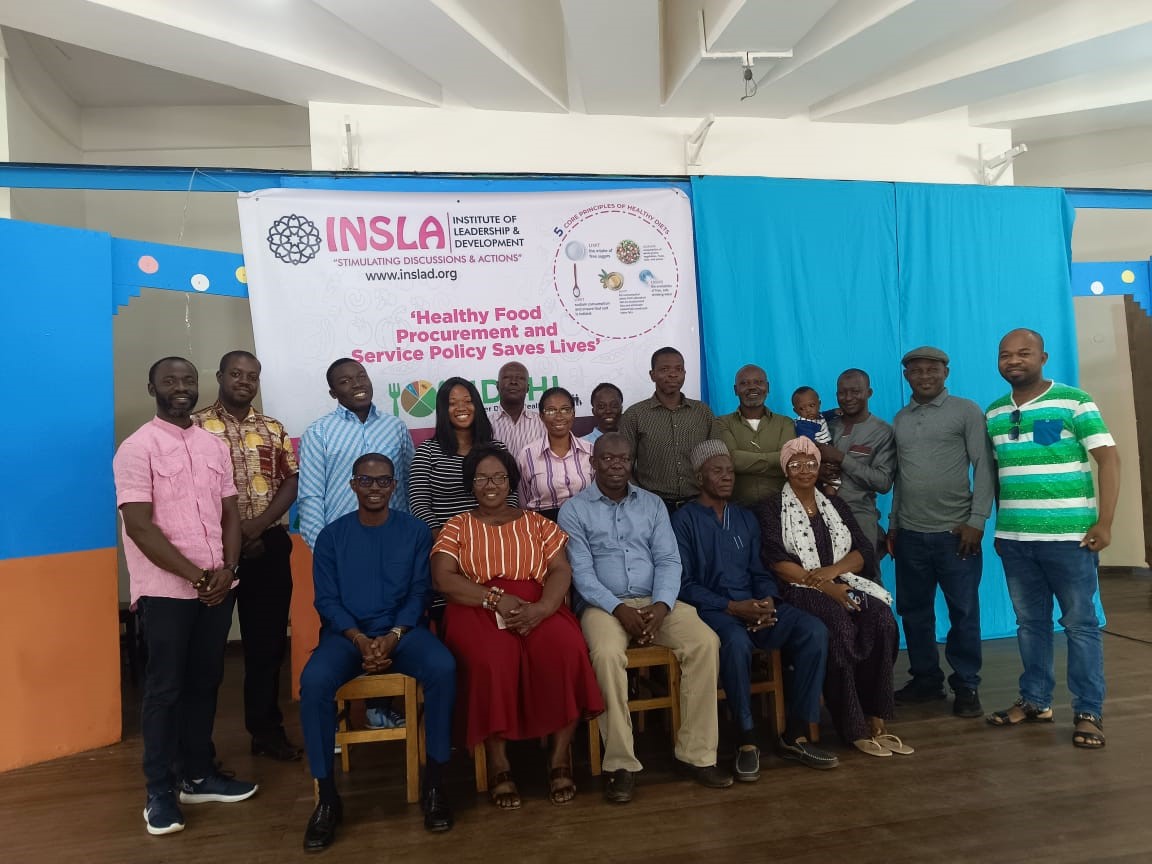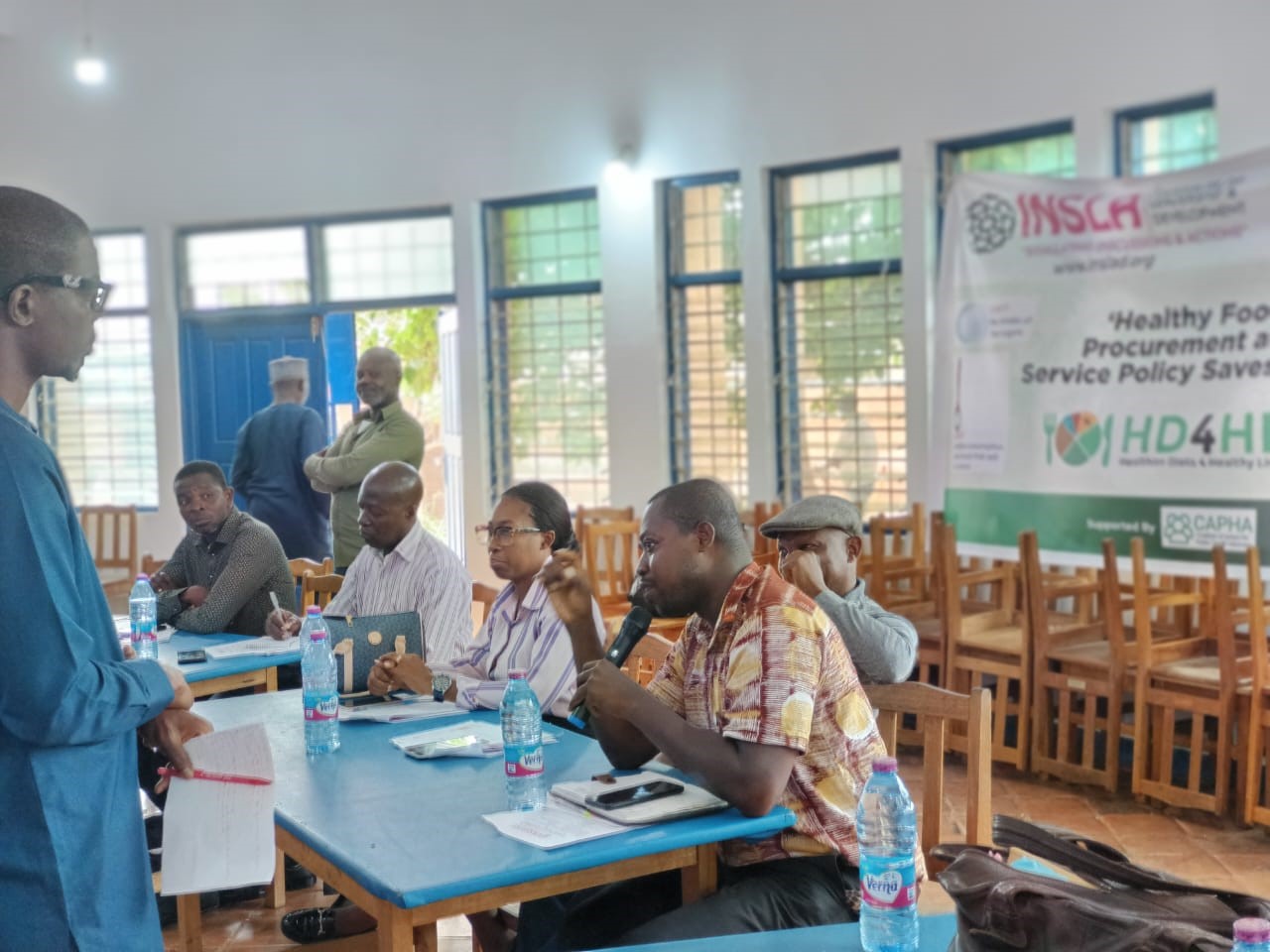
On the 30th of September 2023 the Institute of Leadership and Development visited Original Fm in Accra with the objective of introducing and sensitizing the Ghanaian populace on the public food procurement and service policy of the Healthy Diets for Healthy Lives Project.
The activity started with the host of the Nsem Titiriw show in the person of Mr Martin Kwabena Ahwireng briefing his audience on healthy diets and healthy lifestyles. He mentioned in his brief that unhealthy eating habits and lifestyles are the number one cause of diseases in the country.
Mr Anabila started by appreciating the FM station for granting INSLA the platform to speak through their airwaves to the Ghanaian populace and the world at large. He continued to mention that INSLA has been given the opportunity to be part of the Healthier Diets for Healthy Lives (HD4HL) Project under the auspices of Coalition of Actors on Public Health Advocacy (CAPHA). He said INSLA has been assigned with Public Food Procurement and Service Policy (PFP) as its Focus Area. Mr Anabila further mentioned that the role of INSLA is to sensitize the public on the need for Public Food Procurement and Service Policy (PFP).

Mr Anabila spoke on the WHO Public Food Procurement and Service Policies (PFP) Action Framework. He started by mentioning that the WHO Action framework was developed to promote the adoption of a policy by government to facilitate healthy and sustainable diets, food safety and adequate macro- and micronutrient intake to prevent all forms of malnutrition, the policies ensure that food the government purchases, serves, and/or sells in and through public institutions meet healthy nutrition standard. He continued to state that unhealthy diets are responsible large incidence of non-communicable diseases (NCDs) leading to millions of disabilities and mortality.
He further mentioned that the WHO Public Food Procurement and Service Policies Action framework is a document that seeks to support countries to develop, implement, assess compliance and evaluate the effectiveness of a healthy public food procurement and service policy.
Mr Anabila elaborated on the core principles of healthy diets.
1. Limit the intake of sugars.
Mr anabila mentioned the need for people to limit their sugar intake level and also avoid free sugars consumption to prevent NCDs.
2. Shift fat consumption away from saturated fats to unsaturated fats, and eliminate iTFA.
With the eliminating of TFAs, he advised that people should limit the intake of fast foods, and oily foods. He continued to mention that households should limit oil re-use in frying of their foods since transfats develop in oils that are used continuously over a period of time.
3. Limit sodium consumption and ensure that salt is iodized
He also spoke about limiting the intake of salt. He mentioned that people should practice eating iodized salt. He also educated households on cooking methods that retain iodine in foods such as not adding iodised salt early in boiling foods so as to prevent losing the iodine in foods by the time they are cooked. He mentioned that iodine deficiency could lead to goitre. He also mentioned that people should desist from adding salt to already cooked and served foods before eating.
4. Increase consumption of whole grains, vegetables, fruits, nuts, etc.
He also encouraged that, households should endeavour to eat whole grained foods, fruits, vegetables and nuts for healthy body. He mentioned people shuld take healthy foods as their medicine so as not to make medicine their foods.
5. Ensure the availability of free, safe drinking water.
Mr. Anabila asked for a policy that will provide free portable water to the citizenry. This he assures is doable if we harness our water resources properly and fight environmental degradation. He cautioned people to drink and use safe water in their homes.
He also advised farmers’ especially vegetable farmers to desist from using unclean waters for irrigation purposes and also asked them to use the good pesticides for irrigation purposes since it tends to contaminate the produce thereby causing people who eat them to fall prey to diseases like typhoid.
He concluded the discussion by saying that when government and people are procuring foods for public institutions, the conditions and environment of the foods should be in the best forms. The presenter then asked about how one can access free and safe water. Mr Anabila answered by saying this is what WHO Public food Procurement and service policy framework is saying and as such should be provided by the government. He also cautioned those practicing galamsey to desist from it so that our water bodies can be safe and the huge monies used in treating these waters for consumption can be channelled into a different cause. Mr Ahwireng, the host of the show appreciated the INSLA team for sharing this insight with them and also encouraged his audience to cultivate the habits of eating fruits to keep the immune system active to prevent diseases.